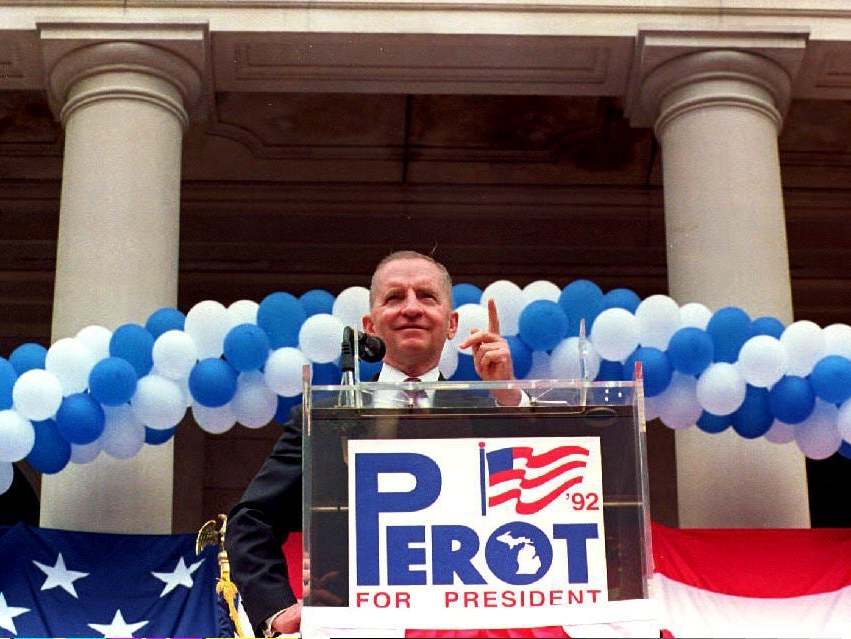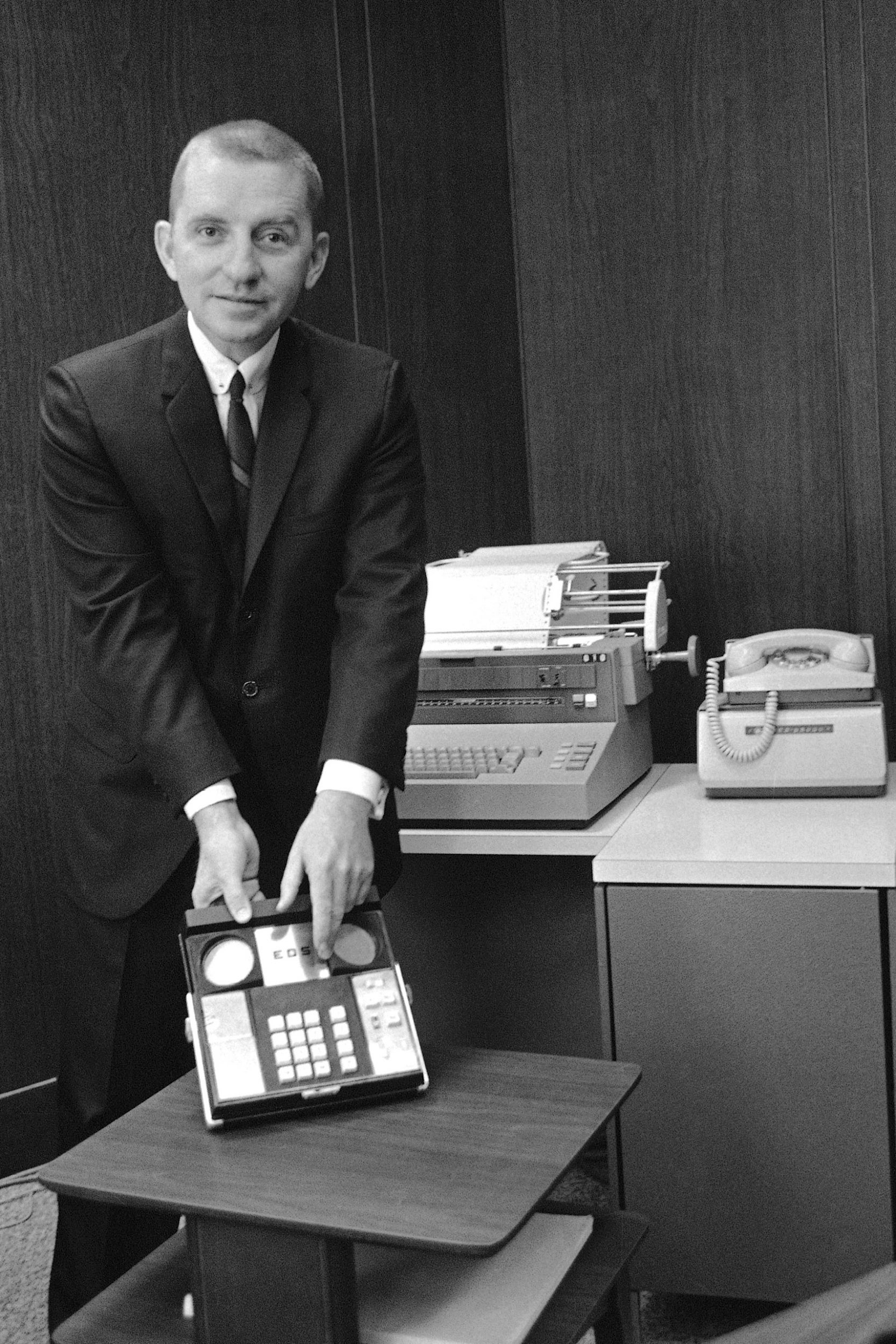Ross Perot: Billionaire who made a spectacular bid for the US presidency
His 1992 campaign was a landmark for a third party in American electoral history

Your support helps us to tell the story
From reproductive rights to climate change to Big Tech, The Independent is on the ground when the story is developing. Whether it's investigating the financials of Elon Musk's pro-Trump PAC or producing our latest documentary, 'The A Word', which shines a light on the American women fighting for reproductive rights, we know how important it is to parse out the facts from the messaging.
At such a critical moment in US history, we need reporters on the ground. Your donation allows us to keep sending journalists to speak to both sides of the story.
The Independent is trusted by Americans across the entire political spectrum. And unlike many other quality news outlets, we choose not to lock Americans out of our reporting and analysis with paywalls. We believe quality journalism should be available to everyone, paid for by those who can afford it.
Your support makes all the difference.H Ross Perot was a Dallas billionaire who offered his business background and homespun wisdom to voters as a third-party candidate for US president in 1992 and 1996. Whether on education reform or foreign policy, a company’s balance sheet or the federal budget, Perot had no shortage of prescriptions over the years, delivered with certainty, simplicity and his Texarkana twang.
“If someone as blessed as I am is not willing to clean out the barn, who will?” he said during his 1992 campaign.
Before taking American politics by storm, Perot – who has died aged 89 – did the same to American business. He sold the first firm he founded to General Motors Corp for $2.6bn, and the second to Dell Inc for $3.9bn, and amassed a net worth of $4.4bn.
Perot began calling out US leaders on the federal budget deficit in 1988, describing the problem as a “crazy aunt that we keep in the basement” that someday would break out and cause havoc. He stepped up his critiques in 1991, as an economic recession and rising unemployment rate were puncturing the approval ratings of the Republican president, George HW Bush.
By the end of that year, an anti-incumbent movement in Florida had spun off an effort to draft Perot for president. His on-again, off-again campaign would provide one of the great spectacles in modern politics.
It began in February 1992 with an appearance on CNN’s Larry King Live. Asked whether he would run for president, he answered with a flat “no”. By the end of the hour, he had boasted about his strengths (“creating jobs and fixing things”), bemoaned the nation’s mindset (“see, we understand sports in this country, don’t understand business”) and finally suggested he might run, if “you, the people, are that serious” and “register me in 50 states”.
Over the next three months, as Bill Clinton, the former Arkansas governor, emerged as the Democratic challenger to Bush, Perot helped his supporters compile the signatures needed to get him on state ballots. He dominated the political discussion and soared in polls, even as he was criticised for offering few details on what he would do as president, beyond holding electronic town halls and attacking the budget deficit.
In July he stunned his backers by saying he wouldn’t run after all. “I have concluded that we cannot win in November,” he said, citing among other considerations “the revitalisation of the Democratic Party”.
Perot reversed himself again, announcing on 1 October – 33 days before the election – that he was back in. He shared the stage with Bush and Clinton in three televised debates that month, offering a memorable turn of phrase when he predicted that the North American Free Trade Agreement would create a “giant sucking sound” as it pulled US jobs south to Mexico.

In an interview with CBS’s 60 Minutes that aired nine days before the election, Perot said the real reason he had dropped out in July was that he had learned of a plan by Republican leaders, whom he wouldn’t name, “to have a computer-created false photo of my daughter, Carolyn, that they were going to give the press shortly before her wedding to embarrass her”. He offered no proof.
On election day, Perot and his running mate, James Stockdale, a former navy vice admiral, received 19.7 million votes, or 18.9 per cent of the popular vote. Though not good enough to win any state’s electoral votes, their total was more than any other third-party presidential candidate since Theodore Roosevelt’s Progressive ticket took more than 27 per cent in 1912.
An exit poll found little evidence that Perot’s presence had influenced the result, although Bush didn’t agree. “I think he cost me the election, and I don’t like him,” he said in 2012.
Perot ran again in 1996, this time as the nominee of the Reform Party, which he had founded the previous year. He received 8.1 million votes, or 8.4 per cent, as Clinton defeated Republican Bob Dole to win a second term.
Henry Ray Perot was born in 1930, in Texarkana, Texas, the son of a cotton and cattle trader. At 12 he let his parents change his middle name to Ross, in memory of their first son, Gabriel Ross Jr, who had died aged three of meningitis. Perot also had an older sister.
Perot learned sales while young, peddling Christmas cards, garden seeds and copies of the Saturday Evening Post. After navy service he joined International Business Machines Corp in Dallas and became a star salesman, reaching his 1962 sales quota in a matter of weeks. He went out on his own that year, borrowing $1,000 from his wife, Margot, to incorporate Electronic Data Systems, an early provider of computer hardware and data-processing services.
By 1968, the year it went public, EDS had annual net profits of more than $1.5m. Of Perot, Fortune magazine wrote that year: “Probably no other man ever made so much money so fast.”
Perot ran EDS with military-type discipline and sometimes pursued a one-man US foreign policy. In 1969, he tried to deliver two planeloads of Christmas dinners and gifts to American prisoners of war in Vietnam, only to be turned away by North Vietnam. He later said that President Richard Nixon had asked him “to embarrass the North Vietnamese into changing the treatment” of POWs, and said he considered the effort a success.
In 1979, a mission arranged by Perot and led by a retired US army officer, Arthur Simons, rescued two EDS employees imprisoned in Tehran. The daring private raid became the basis for novelist Ken Follett’s On Wings of Eagles (1983).
He is survived by his wife Margot, whom he married in 1956, and five children.
Henry Ross Perot, entrepreneur and political campaigner, born 27 June 1930, died 9 July 2019
© Bloomberg
Join our commenting forum
Join thought-provoking conversations, follow other Independent readers and see their replies
Comments